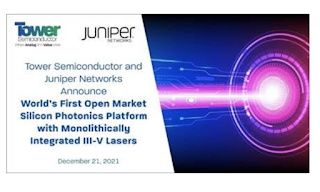OpenLight, a start-used based in Mountain View, California, released its first 800G DR8 photonic integrated circuit (PIC) design targeted at datacenter interconnect transceivers.
OpenLight said its on-chip laser integration and high-speed InP-based modulators removes the need for the procurement and attachment of additional lasers into a PIC, offering scalability with high-speed performance and cost at scale to tackle complex designs. The device is built on Tower Semiconductor’s silicon photonics production process (PH18DA) and is a fully validated PIC design with an associated circuit model and available test datasets. The 800G DR8 PIC sample kits are now available.
OpenLight has fabricated and tested these wafers using the world's first open silicon photonics foundry platform with integrated lasers offered by Tower Semiconductor.
“As the number of users and devices per user continue to increase, the demand for bandwidth and higher data rates will only grow multifold. We are seeing an uptake in the adoption of silicon photonics and believe our first-of-its-kind 800G DR8 PIC design and available tested samples will help customers quickly design optical transceiver modules and enable faster time to market for emerging datacom needs,” said Dr. Thomas Mader, Chief Operating Officer at OpenLight. "Together with Tower, we are able to consistently offer scalable design solutions and support the industry’s move to 800G and beyond for datacenters with integrated lasers."
“Our partnership with OpenLight continues to add new, silicon-proven IP to Tower’s existing open foundry offering enabling customers to accelerate development of next generation silicon photonics products with fully integrated lasers,” said Dr. Marco Racanelli, Senior Vice President and General Manager of Tower Semiconductor’s Analog Business Unit. “The process technology and PDK are available to Tower customers along with regularly scheduled shuttle runs while higher order IP such as the 800G reference design announced here, is available through our partner OpenLight"
https://www.openlightphotonics.com
Synopsys and Juniper form joint venture for silicon photonics

Tower Semi and Juniper develop silicon photonics process










































